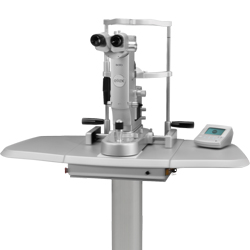GLAUCOMA CENTER
What is Glaucoma?
Colorado Cataract Laser & Vision is proud to offer very thorough and complete glaucoma eye care in Colorado. We are honored to have one of the state’s most acknowledged glaucoma eye doctors and feel confident in our ability to deliver the best glaucoma eye care.
Glaucoma is a disease that permanently damages the optic nerve leading to reduced vision or blindness. It is called the sneak thief of sight because vision loss is often the first sign. By the time someone notices changes in their vision, glaucoma has already caused severe irreversible damage. The best defense against glaucoma is a comprehensive dilated eye exam once a year for those over 40 years old. If glaucoma is diagnosed in its early stages it is a very treatable condition.
The optic nerve in the eye sends signals from the eye to the brain, where they are then processed in the brain. Glaucoma affects this in a slow, progressive loss of the nerve fibers which make up the optic nerve. With a slit lamp, among other special tests using the most advanced technology for glaucoma detection, our doctors are able to visualize this nerve, and determine how much, if any, damage has been dealt from glaucoma.
Do I have Glaucoma?
Common symptoms that lead to glaucoma include:
Generally, people over the age of 60 are at risk for Glaucoma. Other risk factors include:
- Diseases affecting circulation.
- Previous trauma to the eye.
- Myopia.
- African-Americans and Hispanics are eight times more likely to have glaucoma.
If you are overdue for an eye exam, contact us today to setup an appointment!

Types of Glaucoma
The goal in treating glaucoma is to protect the optic nerve from damage by lowering the pressure in the eye. For most people, prescription eye drops help to successfully lower the eye pressure, thus preventing progression and vision loss from glaucoma. Laser surgery (SLT) is an alternative treatment and it may be used along with prescription eye drops. SLT can be repeated and lowers eye pressure in about 80% of people for about 5 years. Surgery may be necessary if prescription eye drops and laser surgery do not adequately prevent progression, glaucoma filtration or drainage implant.
Chronic Open Angle Glaucoma
Angle Closure Glaucoma
Secondary Glaucoma
Congenital Glaucoma
SLT (Selective Laser Trabeculoplasty)
SLT involves laser treatment that is applied to the drain of your eye in order to open it up and let fluid exit more effectively. This treatment only takes a few minutes, is safe, and effectively lowers eye pressure in most people.

Trabeculectomy

Shunts
The procedure begins with our doctors diverting fluid in the eye through a very small tube to the outside of the eye. The device itself is about the size of a piece of rice, and acts like a heart stent in that it creates a pathway through blockage.
The Ex-PRESS shunt provides precise control of the fluid, and helps to maintain a healthy level of internal pressure.

Glaucoma Treatment
The absolute best way to treat glaucoma, is through early diagnosis. It is recommended that you visit your eye doctor at least every two years for an examination.
The goals of glaucoma treatment entails decreasing aqueous humor production, increasing fluid drainage, or a combination of the two. While these treatments cannot restore vision, it can stop further damage to the eye.
Eye drops are the most common treatment for glaucoma. These medications allow for faster drainage of fluid from the eye. Some of the treatments actually reduce the overall production of the fluid. While one form of these medications can help, combinations of them help further. Some patients will need more than just eye drops for their condition, and may require surgery.
Surgery options include, SLT (Selective Laser Trabeculoplasty), Trabeculectomy, as well as Shunts.